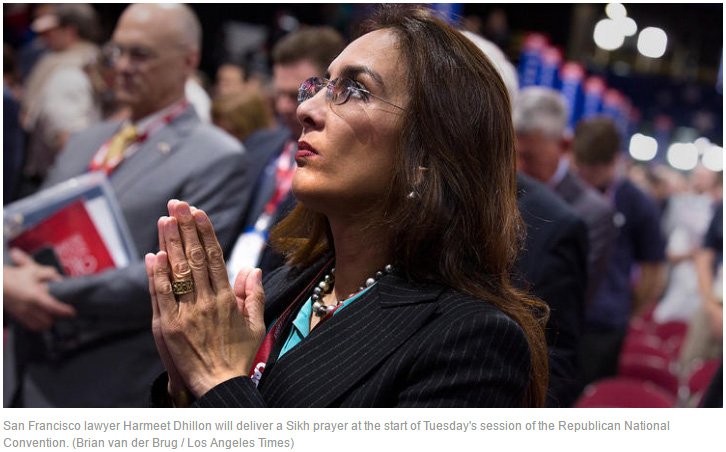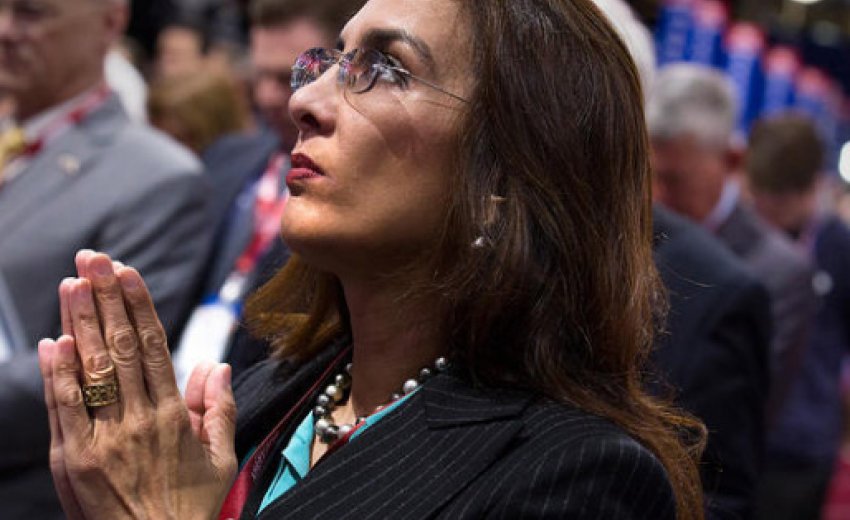
When Harmeet Dhillon first ran for vice chairwoman of the California GOP, rivals whispered that the Indian-born Sikh would slaughter a goat at the lectern.
On Tuesday night, Dhillon will open the second night of the Republican National Convention by delivering the invocation in Punjabi and English.
It’s a first for the RNC. But it’s not the first time the 47-year-old San Francisco lawyer has upended expectations.
Born in Chandigarh, India, she emigrated with her parents first to Wales and then to the Bronx, N.Y. Her father, an orthopedic surgeon, then moved the family to the outskirts of Smithfield, a rural town in central North Carolina.
Dhillon says she was an awkward, chubby child who didn’t fit in at school.
“I had two long braids and a funny name and my mother didn’t dress me in fashionable clothes. I was not popular at all,” said Dhillon, who is now thin with sleek, long hair and wears high-end designer clothing and stiletto heels. (She plans to wear an Escada jacket and a navy-and-gold silk dupatta, or scarf, when she delivers the prayer Tuesday.)
As a child, Dhillon developed a love of reading and was a strong student, ultimately skipping two grades.
Her family became naturalized U.S. citizens and grew involved in community affairs. Her father, a skilled tennis player, joined a country club. Her mother volunteered as a county poll watcher. And the family supported Republicans.
Their politics were driven in part by her father’s contempt for trial lawyers because of medical malpractice lawsuits.
But they also were formed by politics in India in the 1970s, when a militant insurgency in the Indian state of Punjab led to temple raids and attacks on some Sikhs.
Dhillon’s parents hosted multiple fundraisers for Sen. Jesse Helms (R-N.C.), a conservative with strong views on foreign policy. He, in turn, began to speak out against persecution of Sikhs.
Dhillon attended Dartmouth College, where she majored in classical studies. She started writing for the college’s politically conservative paper, the Dartmouth Review, and ultimately was named editor.
In October 1988, the weekly made headlines when it published a satirical column likening the college president to Adolf Hitler, and the effects of his campus policies to the Holocaust.
A drawing on the next issue’s cover depicted the college president, who was Jewish, as Hitler.
As condemnation poured in, Dhillon, then editor in chief, denied in an interview with the New York Times that the column was anti-Semitic, saying critics were “trying to twist the issue to their own ends.”
She said the column sought to compare “liberal fascism” with other forms of fascism and was not meant to trivialize the Holocaust or to show “callous disregard” for its horrors.
''I'm very disturbed about the response to it,'' she said. ''I'm very surprised, very very surprised.''
Earlier that year, three Review staff members were suspended after a confrontation with a black professor. After they won a lawsuit and were reinstated, Dhillon defended them on “60 Minutes,” an early view of the role she later would take for the California GOP.
Dhillon went to law school in Virginia, worked in New York City and London before settling in San Francisco. She remained a devout Sikh.
“I had a very religious upbringing at home,” said Dhillon, whose first name means “God’s friend” in Punjabi. “That was very central to my life from day one.”
She grew active in Bay Area politics after receiving an email soliciting volunteers for the Bush-Cheney re-election campaign in 2004.
She hosted debate watch parties that year but ultimately became the county party chairwoman. She ran unsuccessfully for the state Assembly in 2008. She met her future husband Sarv during that campaign.
In 2013, Dhillon ran for vice chairwoman of the state GOP. She was castigated by fellow Republicans for having once served on the board of the American Civil Liberties Union’s Bay Area chapter.
She says she got involved in the ACLU after some Sikhs were abused in the aftermath of the Sept. 11 attacks. (Her second husband, a turban-wearing Sikh, was shot in 1995 on a New York City bus after being mistaken for a Hindu.)
But some of her opposition at the state GOP was blatantly racist.
Fliers appeared at the convention calling her a “Taj Mahal princess.” The goat slaughter rumors percolated. The leader of a county GOP woman’s group posted on Facebook that Dhillon was a Muslim who would defend beheadings. (The woman was reprimanded by the party and no longer holds the post.) Party leaders came to her defense, and she won the election.
Since then, she has become the public face of the state GOP while the chairman, Jim Brulte, worked behind the scenes to rebuild its war chest. She also did pro bono legal work on behalf of the party, such as threatening to sue when its trademark was infringed upon.
“As she’s proven, she’s a rising star in the party and she’s also a sharp cookie and highly able,” said Charles Munger Jr., a major GOP donor.
“One has to distinguish, she was elected on her merits,” he added. “She got there in spite of being a woman, in spite of being Sikh. She’s the first woman vice chair in party history. There was no royal road paved for her.”
When she ran for national committeewoman, a top post, Dhillon was unopposed and won by voice acclamation.
Dhillon has her critics, notably because of her association with Munger. Conservatives are deeply skeptical of his influence on the party and believe that he is trying to flush them out.
“She’s a wholly owned subsidiary of Munger,” said Mike Schroeder, a former state party leader whom Dhillon sued.
Dhillon also has sharp elbows.
“Harmeet is a very strong-willed personality and she has no problem whatsoever speaking her mind,” said Jon Fleischman, an influential conservative blogger. “I’m like that too and necessarily that means speaking up for myself. I know I’m an acquired taste. I would submit she is as well.”
Dhillon is known for an acerbic wit. During the 2013 party elections, Brulte recalled a visit to a party fundraiser in Stanislaus County, where he saw a noticeably thin man receive the volunteer of the year award for walking precincts.
"I said to the people at the table, ‘You see, when you walk precincts you lose weight,’" said Brulte, who is not svelte. Dhillon "spun around, looked at me and said, 'You should walk a few.'"

